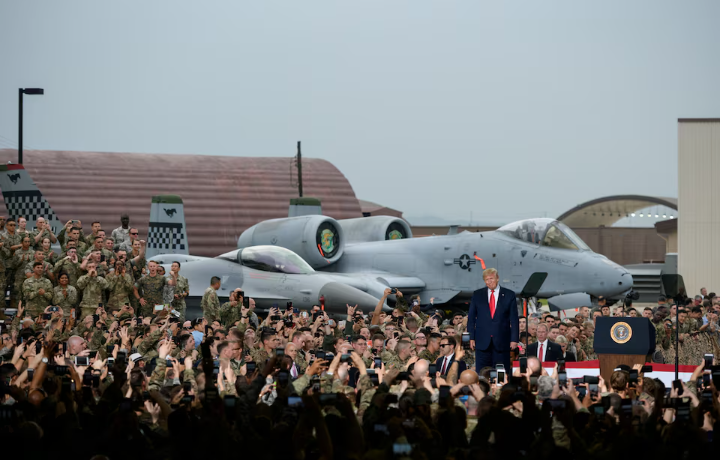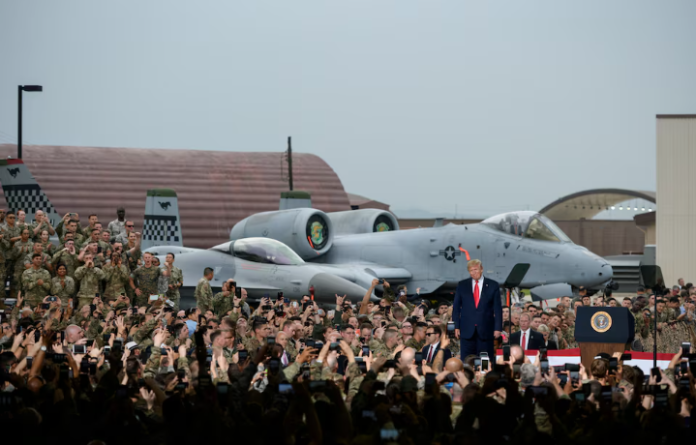In a move that’s stirring diplomatic waters in East Asia, former U.S. President Donald Trump has signaled that American troop deployments in Japan and South Korea are back on the negotiation table—this time as bargaining chips in his renewed push for tougher trade terms.
Trump took to Truth Social this week, making it clear that he intends to fold defense cost-sharing into broader trade negotiations. “One-stop shopping,” he called it, as he suggested countries like South Korea and Japan are benefiting economically from the U.S. military presence without paying enough in return.
Currently, South Korea hosts approximately 28,500 U.S. troops, while Japan accommodates nearly 50,000—marking the largest overseas deployment of American forces. Both countries have long relied on U.S. military support as a shield against powerful neighbors like China, North Korea, and Russia.
However, Trump’s transactional view of international alliances is raising concerns in Seoul and Tokyo. South Korea’s First Vice Foreign Minister, Kim Hong-kyun, told parliament that while the United States hasn’t officially proposed revisiting the Special Measures Agreement (SMA), Seoul is preparing for any potential changes. Finance Minister Choi Sang-mok was more firm, stating that the cost-sharing deal “is not up for review.”
Japan is equally cautious. A Japanese government official told Reuters that defense and trade negotiations should remain separate, underlining Tokyo’s desire to avoid conflating military obligations with tariff disputes.
Analysts see Trump’s strategy as deliberate pressure, aimed at forcing economic concessions by leveraging national security. Danny Russel from the Asia Society Policy Institute noted that Trump treats alliances like business transactions—expecting financial returns for military protection.
In 2021, ahead of the U.S. election, South Korea signed a new five-year SMA under the Biden administration, agreeing to a first-year contribution of $1.47 billion—a significant 8.3% increase. But with Trump’s re-election campaign gaining momentum, that effort to secure long-term stability may now backfire.
A South Korean official speaking anonymously said the early renegotiation—though well-intentioned—may have inadvertently raised the bar for future talks. “Now, if we have to renegotiate, we’re starting from a higher baseline,” the official said, stressing the importance of keeping defense costs off the trade table.
Meanwhile, South Korea is under an interim government after President Yoon Suk Yeol’s impeachment. A new election is slated for June 3, and the political uncertainty adds another layer of complexity to the ongoing alliance dynamics.

Japan’s agreement, set to expire in 2027, already contributes an estimated $1.48 billion annually for the upkeep of U.S. forces. With Trump’s renewed rhetoric, it’s uncertain whether those terms will hold.
Adding fuel to the fire, Trump has mischaracterized parts of the agreements in public statements. He claimed cost-sharing began under his administration and was canceled by Biden—claims refuted by experts who note these agreements have existed since 1991.
Despite the political drama, U.S. military officials have praised South Korea’s defense spending and weapons purchases. General Xavier Brunson, commander of U.S. Forces Korea, called these investments “strategic” and said they reflect the enduring U.S.-Korea partnership.
Still, the growing tension raises uncomfortable questions: Will allies cave under pressure? Or will Trump’s aggressive tactics jeopardize longstanding security partnerships in Asia?



